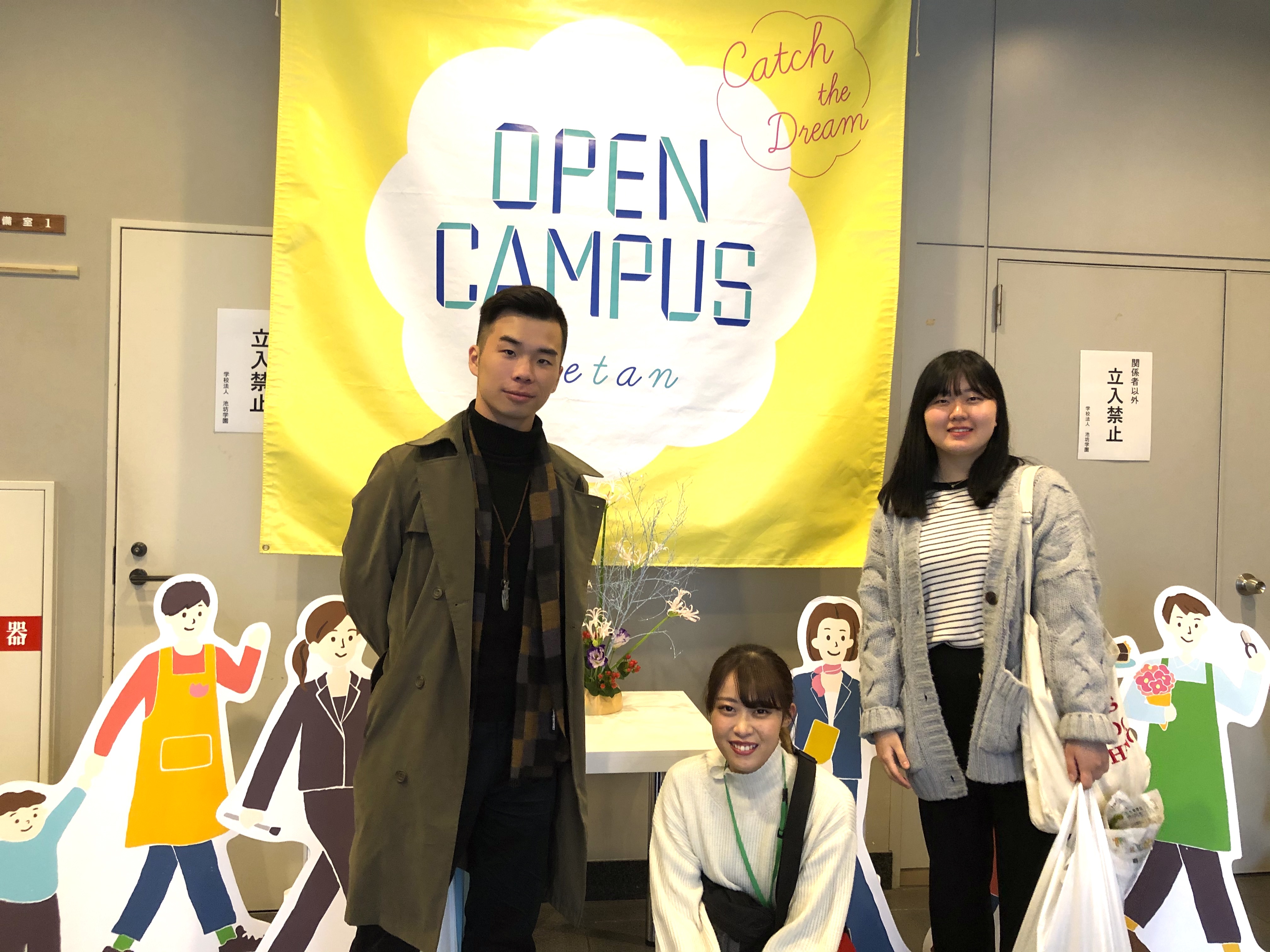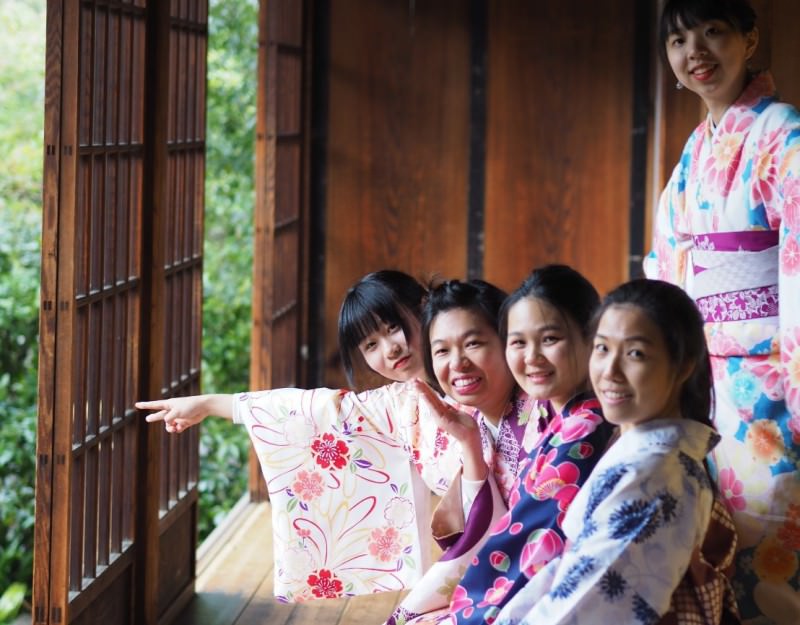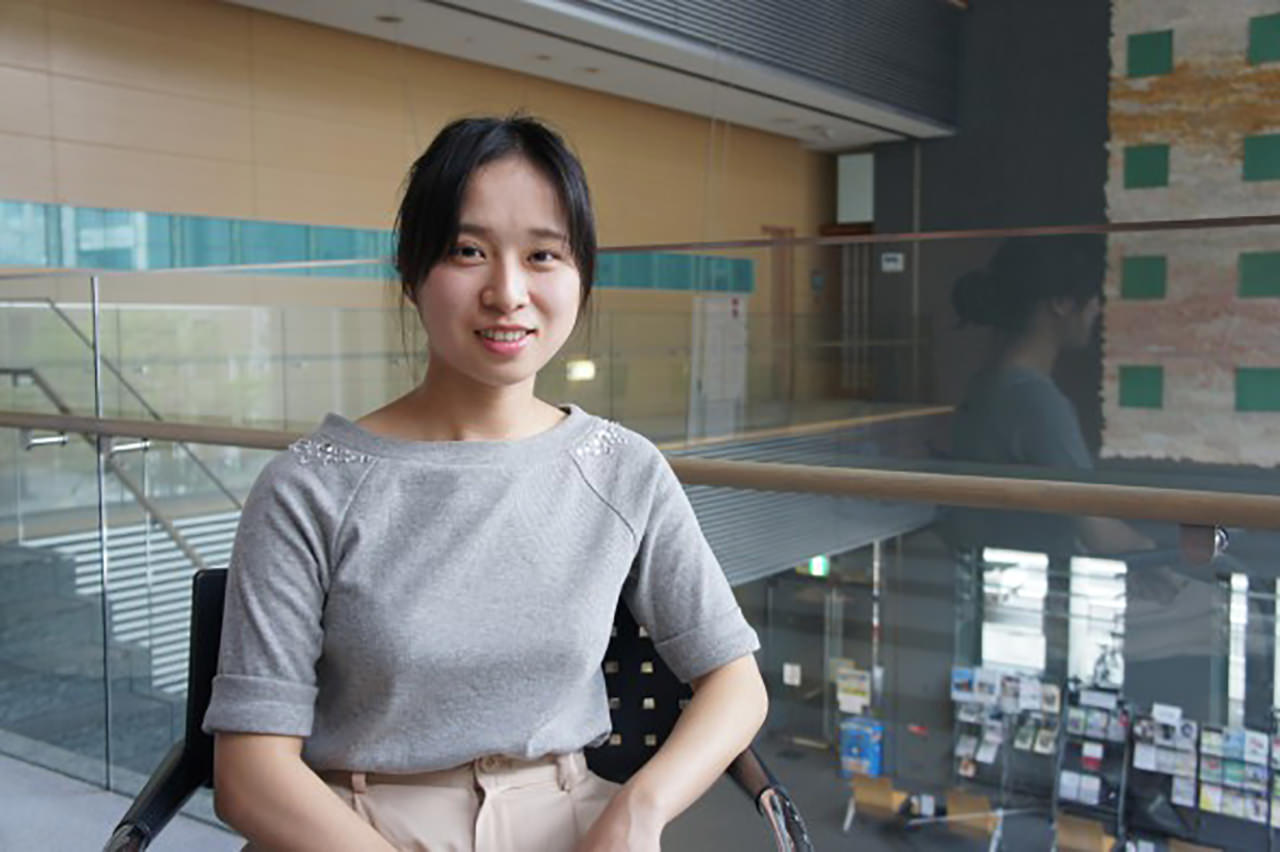สำหรับคนที่อยากมาเรียนสายวิทย์ที่เกียวโต – บทสัมภาษณ์นักเรียนต่างชาติที่เรียนด้านภูมิคุ้มกันและจีโนมิกส์ทางการแพทย์ที่มหาวิทยาลัยเกียวโต
2017.03.30
Why the Sciences?
Q: What first made you interested in studying the sciences?
Yin: It wasn’t really a moment of inspiration for me, but I had an excellent teacher in undergrad that made me want to continue my research. Back then, I was studying biotech and alcohol production, so that’s totally different from what I’m doing now, too. (laughs) I really just like doing research and experiments, though, so I want to continue doing that.
Romina: I actually did something crazy, just like Azza. (laughs) I had a job, too—I was working for NesCafe, in the nutrition department, and I had a very good contract with a pharmaceutical company there. But I quit my job and I came here, because I didn’t really feel satisfied in the business market. I wanted to do something tangible for patients, to help people. In my opinion, immunology is a very creative field, too, which I liked. So I quit my job and came here on the MEXT scholarship, too.
Before that, I got my Masters in biotechnology in India. When I started my Masters, biotechnology was a very new field in Iran. Everyone was very excited about it, and there was a new biotechnology foundation and institute in Iran. So I went to India to study biotechnology. But while I was there, I discovered some courses on immunology, and I became fascinated by them, and I changed my major halfway through. Then I went back home and I got my job in Iran during the sanctions, when it was very difficult for anyone to find a job. I was very lucky.
In Iran, many people in the younger generations are immigrating to other countries, so I was under a lot of pressure to get the MEXT scholarship. But I got it, and it was a big opportunity, so I packed everything and I came here.
Azza: Since I was in high school, I’d been reading books about cancer, about treatment, about how people are treating the diseases that cannot be treated. I love things like that—they’re like puzzles. (laughs) Then when I wanted to enter medical school, I applied and got into medical laboratory science. It’s not like a doctor—it’s more the analysis side. But I started to think that I wanted to try out research. I actually found some professors who were doing some small research projects in their labs with small budgets, and I begged them to accept me as a volunteer, to let me help them with small things once I’d finished my lectures. Even during the summer, I would go to the lab. My family would say, “What are you doing? Stay at home!” But I told them, “No, I want to go!” (laughs) So every summer I would go all the way to the university in the capital. It was far away, so I would usually stay there, and just go home on the weekends. They were very kind to let me stay.
I got very interested in research, and while I was at the university, one of the doctors invited me to present at some medical student conferences in Saudi Arabia and the UAE, even though I wasn’t a medical student. After that, I started to think that maybe research is my path, that I’m being guided to research.
I found a scholarship, so I thought I would apply to study oncology, since I’d been reading about cancer, and I thought I’d like to research cancer. And there I started. (laughs)
Q: What do you enjoy the most about your research?
Azza: I like learning new techniques for experiments. I feel like learning a new technique is like learning a new skill. It’s exciting to think about how I can use a new technique in other projects. That’s what I enjoy the most.
Romina: For me, it’s when I go to a symposium or a conference. They’re doing the same immunology that I’m doing, but when they start to talk, I see that I’m in the first step, and they’re in the 1,000th step. (laughs). Asking them how they found a result, or reading their articles shows me how I have to continue to grow. That makes my research very interesting for me.
Yin: I think the lab’s really lively. The other students often stay really late; they’re really hard-working. The professors are always present at meetings, and in class, of course, too. They’re very accessible to the students. The professors and the other students in my lab are all extremely knowledgeable, and they’re really nice about answering whatever questions I ask them. I’m really surrounded by lots of people I respect.
What do you do for fun?
Q: What about student life?
Yin: This was during my Master’s studies, but there’s one thing in particular I remember. I was taking Japanese classes in Uji at the time, and I would often bring along books that I liked to read and study with on my own. If I needed to, I could always ask the teacher questions. Most of the other students were older folks, but I had a lot of chances to have fun outside of the classroom. That was a really fun time for me. It felt very home-y for me.
Romina: As far as student life goes… mostly I’m just living on campus. Even on the weekends, because my place is very close to campus. I have good access to come to the lab, and I see some of my lab mates here on the weekends, even on Sundays, and it makes me realize that you need to be a little crazy to continue this way. (laughs)
But symposiums or conferences are very good opportunities to get close to your lab mates, or to escape from them if you want. (laughs) But there are some events, like our hanami (cherry blossom viewing party) event in the lab, when we can all get together and see a different side of one another.
Azza: I’m the kind of person who likes to meet people, and likes to do activities. I can’t count all the things I’ve done in the past six years, but in general, I involved myself in Japanese culture by learning shodo (Japanese calligraphy), by learning tea ceremony, aikido for a short time. I love badminton also, so I try to involve myself with badminton. I was doing volunteer massage for the orphans in Kobe on the weekends.
Also, I like cycling. I went cycling around Lake Biwa—it took two days. I love hiking, too, so I like to go hiking many times per year. I choose a time when it’s very cold, so that I can hike from eight until six: from Kitayama Mountain to Arashiyama. Yeah, we’re a little crazy. (laughs)
Please share a message for prospective students!
Q: Do you think studying abroad has helped you to grow (as a person)? If so, how?
Romina: Of course it helped me. Before coming here, I was in India, always surrounded by other international students, and I was living far from home, as I have most of my life. I always try to make my sentences clear to people to avoid misunderstandings, because it’s happened to me many, many times in different cultures. Unique things in different cultures have helped me, too—like in India, meditation; over here, learning something about samurai, the bravery they have—it’s helped me a lot.
I try to grab everything that interests me in different cultures, different concepts—everything that’s close to my personality. (laughs)
Azza: I’ve had so many opportunities here. When I first came here from Oman, I couldn’t ride a bicycle and I couldn’t run at all. I learned cycling fairly quickly, but the brakes were a problem for me at first. (laughs) I pushed myself to run, too: when I saw the people running along the Kamogawa River, I felt that I should learn that. I’d never gone running in my life, but I registered myself in a 15 km marathon in Shiga Prefecture. A friend helped me to practice for a few months, and then I did it. I feel so happy when I see the certificate that says I participated, because it makes me feel like if you just try, and practice, you will be able to achieve something that you never thought you could do—even running for two hours! I wouldn’t be able to do this in my country—it’s too hot. Here you have rivers, cool weather: everything is just fit to do this kind of activity. I think life here has fit me exactly.
Yin: I’ve grown in so many ways! I think one of the biggest things has been with my consideration for other people. People in Japan tend to think about the feelings of other people when they act, and I’ve learned a lot from that.
Q: Do you have any suggestions for things to do in Kyoto while on study abroad?
Yin: When I first arrived I went to a bunch of shrines and temples. Recently I’ve been spending a lot of my weekends at the movie theater, but Uji is still one of my favorite areas.
Azza: I think students should try to be involved in as many activities as they can. Kyoto University has KI-ZU-NA, the student lounge; or you can apply for a host family—a Japanese family that would like to have students visit them. Kyoto University has so many opportunities, so students shouldn’t just limit themselves to their labs. They should try if they can, at least on the weekends, because they will see a lot of fun around! There are also a lot of Facebook groups—“Cycling in Kyoto,” “Hiking in Kyoto”
Romina: And who doesn’t like to go to Shijo and Gion? There are some very unique streets over there. I have a Japanese host family, and my host mother brought me a kimono. In Gion, you can wear a yukata, and just enjoy living in Kyoto. If students want to continue their education in the lab like us—they have Sunday for themselves! (laughs)
Q: Please share a message for students who are hoping to study the sciences in Kyoto.
Yin: In research labs in Japan, a lot of students tend to throw themselves into it completely. If you find an area that you’re really interested in, you can throw yourself into it completely, too. I hope you’ll find something that really sparks your interest!
Azza: When I was in undergrad, I wrote a poem in English called, “Find Your Way,” and that’s really what’s pushed me my whole life. The poem was published in a small magazine at my university. It’s the message I tell myself and my friends all the time: just try to find your way. Everyone has his or her own way. At the beginning of the poem, I wrote, “If you have a goal, hope will never die. Raise high your soul, you are here to try.” I feel like this is true for everyone: don’t stop while your heart is still beating. Don’t stop.
So if you want to come to Kyoto, just decide it. Try it. Maybe it will fit you, maybe it will not—like any other place—but it will leave an experience in you that will help you.
Romina: I think studying science in Kyoto is very unique because of the sensei’s. Most of them are very famous in the sciences. They are very helpful, and they will lead your project to help you get your results. People here are very nice, in general. It’s great to study science in Kyoto!











